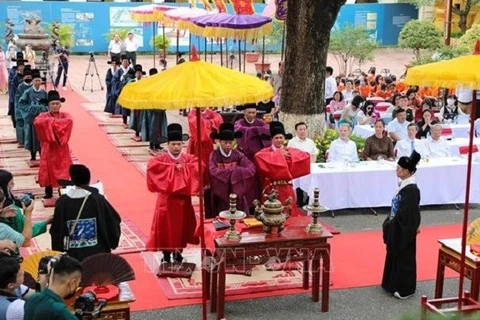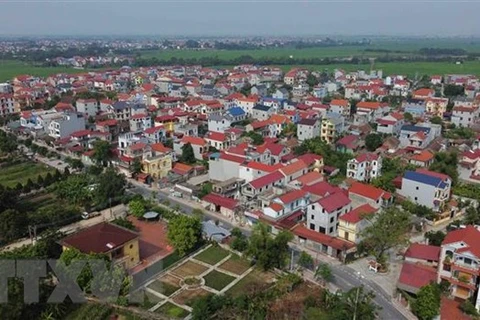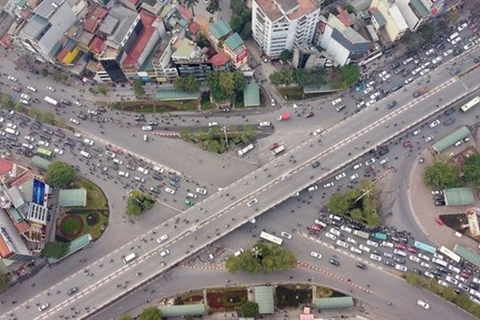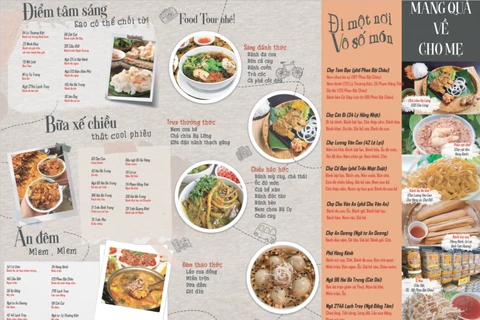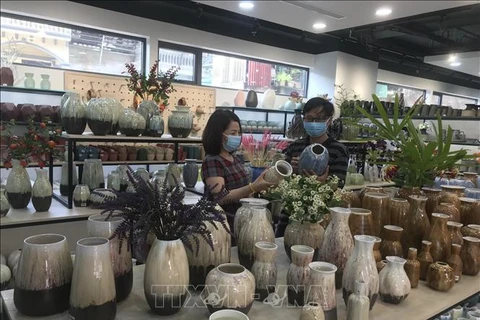 A festival with the theme “The Quintessence of Hanoi – Converging and Shining” was held on the pedestrian streets around Hoan Kiem Lake in Hanoi. (Photo: VNA)
A festival with the theme “The Quintessence of Hanoi – Converging and Shining” was held on the pedestrian streets around Hoan Kiem Lake in Hanoi. (Photo: VNA) Hanoi (VNA) – Many traditional festivals and rituals have been revived across the capital city of Hanoi, with the community playing a decisive role.
Lang Pagoda Festival, a traditional Spring Festival of people living by the To Lich River held in the third month of the lunar calendar, is an example.
This year, for the first time in 70 years, all the folk rituals that made the Lang Pagoda Festival a unique event in the past have been restored.
Being built in the 11th century, Lang pagoda has always been a famous pagoda in Hanoi for its wide space, various antiques and Buddhist statues. The Spring festival at the pagoda is organised to show the gratitude to King Ly Than Tong (1116 - 1138) - the fifth king of the Ly Dynasty, and monk Tu Dao Hanh (1072-1116). It was a lively spring festival of the whole area that attracted people living on the sides of To Lich River nearby to attend. The festival involves ritual ceremonies and traditional games like swinging, wrestling, chess playing, tuong and cheo performances, among others.
For a long time, not all of the old rituals during the festival were carried out. However, this year, the organising committee has determined to bring back all traditional rituals of the festival such as “Te le” (offering), “Do Ha” (palanquin parade on the river) and “Dau Than” (fighting between gods). Every ritual has a unique meaning based on myths about Tu Dao Hanh.
Ha Anh Tuan, vice chairman of Dong Da district People’s Committee said the revival of traditional rituals at the Lang Pagoda Festival is of great significance, creating a distinctive feature of the city.
The same situation is seen in many other festivals in Hanoi, such as the festival of the five Moc villages, Dong Co Temple Festival, Thap Tam Trai (Thirteen Villages) Festival and Tan Vien Son Thanh (Tan Vien Mountain Saint) festival. The revival of rituals is made possible thanks to the active engagement of local communities. Local residents enthusiastically take part in discussions on restoring the rituals and choose people to perform the ceremony.
Bui Thi Huong Thuy, deputy head of the Heritage Management Office under the city’s Department of Culture and Sports, highly appreciated the role of the community in assisting the unit set up dossiers for national intangible cultural heritage and helping localities restore ancient rites. According to Thuy, many festivals and traditional rituals have been lost in the flow of time, causing regret among local communities. Therefore, when localities want to revive them, local residents are eager to join in the work.
As the national cultural centre, Hanoi has put an emphasis on investment in cultural development. The city's Party Committee has issued a programme and a resolution on cultural development.
With 1,206 traditional festivals held throughout the year, particularly in Spring, Hanoi considers them a great resource to attract tourists to the city. The capital city is among localities with the richest cultural heritage in Vietnam, with 1,793 intangible cultural heritage items, including three UNESCO-recognised Intangible Cultural Heritages of Humanity, one on UNESCO list of Intangible Cultural Heritage in need of Urgent Safeguarding and one World Documentary Heritage./.

